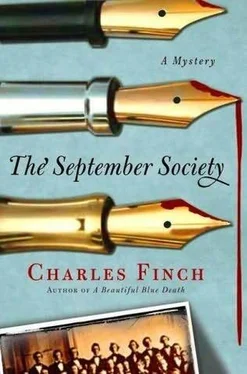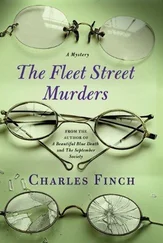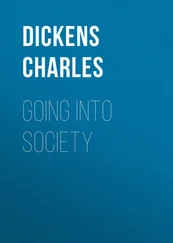Charles Finch - The September Society
Здесь есть возможность читать онлайн «Charles Finch - The September Society» весь текст электронной книги совершенно бесплатно (целиком полную версию без сокращений). В некоторых случаях можно слушать аудио, скачать через торрент в формате fb2 и присутствует краткое содержание. Жанр: Исторический детектив, на английском языке. Описание произведения, (предисловие) а так же отзывы посетителей доступны на портале библиотеки ЛибКат.
- Название:The September Society
- Автор:
- Жанр:
- Год:неизвестен
- ISBN:нет данных
- Рейтинг книги:4 / 5. Голосов: 1
-
Избранное:Добавить в избранное
- Отзывы:
-
Ваша оценка:
- 80
- 1
- 2
- 3
- 4
- 5
The September Society: краткое содержание, описание и аннотация
Предлагаем к чтению аннотацию, описание, краткое содержание или предисловие (зависит от того, что написал сам автор книги «The September Society»). Если вы не нашли необходимую информацию о книге — напишите в комментариях, мы постараемся отыскать её.
The September Society — читать онлайн бесплатно полную книгу (весь текст) целиком
Ниже представлен текст книги, разбитый по страницам. Система сохранения места последней прочитанной страницы, позволяет с удобством читать онлайн бесплатно книгу «The September Society», без необходимости каждый раз заново искать на чём Вы остановились. Поставьте закладку, и сможете в любой момент перейти на страницу, на которой закончили чтение.
Интервал:
Закладка:
“Did he mention any names?”
“No, he didn’t.”
“Why did you believe him?”
Payson laughed wearily. “I didn’t, not at first. I asked whether he was after money, perhaps. He only chuckled and took out an enormous pocket watch. It was from a London firm and had my father’s name engraved on the back. Canterbury said that my father had asked him to keep it for me, but that he was only returning it now-had only returned now, in fact, from India-because of the threat of the Society. Because some anniversary was arriving, or something that I had done-something. It was vague.”
Just so, Lenox thought. The pocket watch that the innkeeper who had identified Geoffrey Canterbury had noticed. “That might have been engraved last week, though.”
Dabney shook his head. “I don’t think so. It looked authentic, for one thing-you’ll remember those old watches of the forties-and the inscription was well worn, nearly faded. I have it here.”
He took it from his pocket and handed it to Lenox, who examined it closely.
“In addition to which,” Payson went on, “Canterbury was simply plausible. He spoke familiarly of my father, the way my grandparents once did. Of his temper, of his winning manners when he was in a good mood, of his impetuousness. It didn’t seem at all feigned to me. You may judge my judgment as you will, of course.”
“I see. And,” he said, handing the watch back, “it does look authentic. How did you leave it with Canterbury?”
“He said he was going to go to London to look into matters more deeply and advised me to be ready to run at any moment. We agreed on a system of communication to arrange our meetings-”
“The empty letters you received?”
“Yes! How did you-? But yes, we settled on our next meeting every time we saw each other, and the empty letters indicated that the meeting was still on.”
“How many times more did you meet?”
“Twice more, in different villages outside of Oxford. Until the night before I was forced to leave.”
“That dance card,” murmured Lenox. “You sent it down as a blind, with a separate note explaining that if he signed it Roland Light, your scout’s name, it would appear incidental.”
“Exactly. My, you really are omniscient.”
“On the contrary, I’m as slow as the milk train.”
“Canterbury wrote to me saying that he needed to see me urgently, and we agreed to meet at the Jesus ball. I was too nervous to dance or have anything like fun. We met, and he told me that I had to flee.”
“Did he give a reason?”
“No, he didn’t, but he seemed genuinely panicked.”
“I see.” Was it Lysander? Why? “Why did you meet with Hatch just before you left? At Shotter’s?”
“Ah, there you’ve found one of the small secrets I was concealing, Mr. Lenox. I don’t need anybody else hurt over me or my father.”
(Was there bitterness in this last word? Hopes of some further knowledge of his missing parent dashed?)
“What do you mean?”
“Professor Hatch was the only person I told about Canterbury, except Dabs. I had been sitting with him one morning on the lawns and it had just burst out of me, in fact. Old Hatch was a brick about it, a real brick. He talked me through all of the possibilities. He encouraged me to talk about things-about feelings-that I never had before.”
“And that morning?”
“I was in a panic. I had agreed to meet with him the night before, and I sent a note over suggesting Shotter’s-a townie place, not many students or dons there, which I always rather liked. He met me, and I told him what I meant to do.”
“Then you rushed back to your rooms, saw your mother… tell me, did you kill Longshanks?”
Payson shook his head. “He was dying. We had taken him, Dabs and I, out to one of the country vets round about Oxford, and he had cancer, poor chap. I loved that cat like a brother…”
“So you fed him laudanum?”
“He was in my lap the entire time, as trusting as he could be, the dear thing… you know, it’s funny, but I feel near tears again. All of it’s so bound up in my mind… my father, Dabney… this ridiculous cat.” The lad covered his face.
“And you stabbed the cat with your father’s letter opener, left a message beneath in public school cross-tip-and then you saw your mother in the courtyard?”
“Yes, precisely. I suppose she told you that. I put her off with some excuse. I know it seems cruel, but I knew she would set the alarms, and I needed people to know I was in danger-though what kind of danger I didn’t really know.”
“And Hatch brought you a parcel, later that day?”
“Yes-but how… yes, he did, down south of Christ Church Meadow. He came and said that if I was going to be obstinate I might as well have some help. The parcel had some food in it, a few other necessities, a bit like the packages one used to get in school, you know.”
“Then it might be he who betrayed you.”
“Never! He specifically said he’d keep our secret till the grave. Said a few cheery words, and then wished Bill and me good luck. Bill!”
Here payson stifled a sob. Lenox looked past him toward the sunny streets, lost deep in thought.
CHAPTER FORTY-EIGHT
The two men spoke until nightfall, as Lenox gently pushed Payson to fill out his story with more detail. By the time they were done a part of the mystery was gone-the irrelevant part. All the clues Lenox had so ingeniously gathered and speculated about fit tidily into Payson’s explanations.
But the larger question loomed. What was the nature of the history between Payson’s father and his old battalion mates that it had such force twenty years into the future? That ostensibly reasonable men would kill for it?
As he went to sleep that evening Lenox felt a number of things. He was sorry for the loyal Bill Dabney and his parents; he was apprehensive about the Society’s meeting; and in some small part of his mind he was relieved that it would all be over soon. It had been a strange and laborious case, doubled in anxiousness for him because Lady Jane was still so far from being his wife.
The next morning he wrote letters to McConnell and Jenkins. To the inspector he wrote a succinct summation of his plan, forgoing any mention of his young visitor, and asked him to be on hand somewhere outside in case either there was an arrest to be made or the plan collapsed. The note to McConnell was shorter and affectionate; in it Lenox proffered another adventure, gave the time and location where he could probably find Jenkins, and advised him not to come. You are going to be a father, Lenox wrote, and though he knew it to be beneath him felt once more a pang of jealousy, and it’s better that you give up being shot at or manhandled just for now. He also wrote to Rosie Little, aching to tell her about George Payson, but bound to keep his secret-and hers, of course, for he hadn’t mentioned Rosie to George.
Five o’clock approached rapidly. Lenox and Payson had lunch together and discussed their plan, agreeing to hide in separate parts of the September Society’s main room so that if one were exposed the other might at least have a chance of remaining concealed. Lenox tried again to convince his young friend to stay behind, but Payson was grimly determined to participate. One way or the other, he said, he would see it through to the end. There was no backing out of it now.
Lenox’s last act before they left was to write a note to Lady Annabelle, who after all had set him on this course. He told Mary, “Send this the moment I signal you to, please.” It bore the tidings of her son’s resurrection.
Finally, at a few minutes before five, the two set out in soft-soled shoes, charcoal gray suits, which were meant to look inconspicuous, though Payson’s borrowed one was too large for him, and low-brimmed caps. At the Royal Oak, Hallowell was waiting for them at a front table. He looked extremely nervous.
Читать дальшеИнтервал:
Закладка:
Похожие книги на «The September Society»
Представляем Вашему вниманию похожие книги на «The September Society» списком для выбора. Мы отобрали схожую по названию и смыслу литературу в надежде предоставить читателям больше вариантов отыскать новые, интересные, ещё непрочитанные произведения.
Обсуждение, отзывы о книге «The September Society» и просто собственные мнения читателей. Оставьте ваши комментарии, напишите, что Вы думаете о произведении, его смысле или главных героях. Укажите что конкретно понравилось, а что нет, и почему Вы так считаете.












